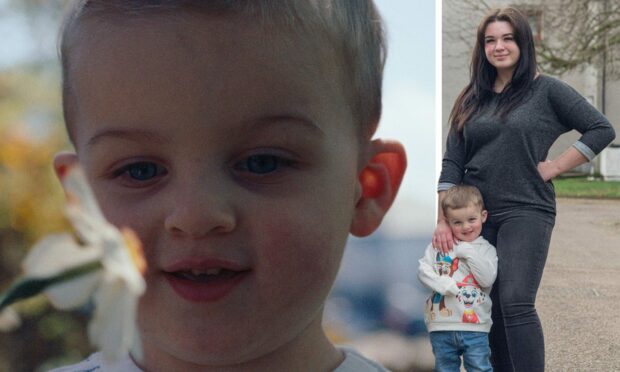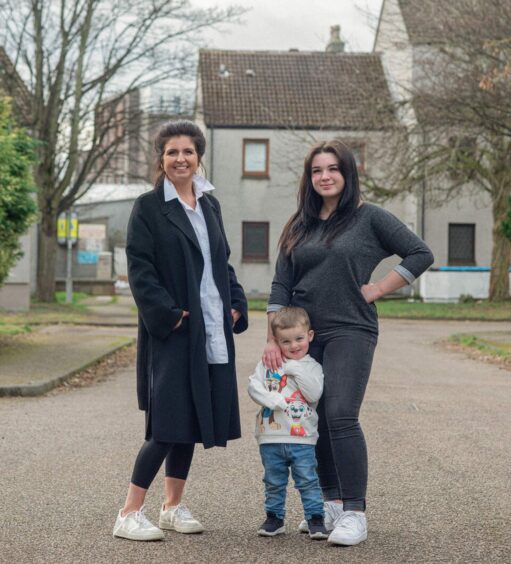An Aberdeen mum has opened up about her struggle to make ends meet amid rising food prices.
She spoke to the P&J as new research by Robert Gordon University (RGU) showed food poverty among young mothers in the north-east is getting worse.
Laila Kesson, 19, said her struggles began when the cost of her two-year-old son Declan’s formula milk went up by £3.
‘Your job as a mum is to provide for your children’
“It started rather suddenly when that went up and I had to look for an alternative,” she said.
“I felt a huge amount of pressure and worry. Trying to make sure my son had a healthy diet and give him what he needed and also wanted – it was just impossible.
“I felt like I was letting him down and it was heartbreaking. It was just a really hard time.
“Your job as a mum is to provide for your children and when you can’t, it is a lot to process and has a huge impact on your mental health.”
‘I cut back on everything to put food on the table’
To try and ease her and Declan’s situation, Laila tried to find work. But as a single parent, this proved hard with a young son to look after at the same time.
“I cut back on everything I could, and on all social activities for Declan, to make sure I could put food on the table,” she said.
Laila finally managed to turn things around when she began working for AberNecessities, a baby bank that provides for disadvantaged families in the north-east.
Her work there as an operations assistant means she is now able to provide for herself and Declan.
But through her work with the charity, Laila has seen first-hand how food poverty among young mums in the area is getting worse, not better.
“The cost of everything is going up,” said Laila.
“Every shop you go into, prices are up by so much, and it can be hard to keep up with, which means less food in the fridge.
“Money simply doesn’t go as far as it used to or as far as you need it to.
“I feel like everyone is in a difficult situation and everyone is struggling to some degree.
“I know from working at AberNecessities we have seen a huge spike in applications and the cost-of-living crisis is a major reason for that.”
The stigma of food poverty
She feels there is still a stigma attached to food poverty, but that anyone who finds themselves in a difficult situation should know that there is help out there.
“It is massive thing because you can feel judged for purchasing the cheaper products.
“But the more people talk about it, the more support you can find.
“Services like AberNecessities are a lifeline to families and provide support with absolutely no judgement.
“I was referred by my family nurse and then developed a relationship with the team.
“I have been on both sides of it – I have received the help and now I get to help provide support to other families who are struggling.
“It’s an amazing thing to be a part of and I am so proud to be involved.”
RGU research reveals worrying trend
Research led by RGU revealed that food poverty among young mums in the north-east has increased since the pandemic.
Working with health professionals and a food pantry network in the region, the research team carried out two interview studies to explore the experiences of parents of babies and toddlers from low-income households.
It highlighted ‘worrying levels of poverty-driven food insecurity’.
Research leader, Professor Flora Douglas, said that over a fifth (21.8%) of children living in Aberdeen and Aberdeenshire are living in poverty.
Many parents on low incomes felt ‘shame and embarrassment’ about seeking help.
‘Society is not paying enough attention to how bad the situation really is’
“The situation has got far worse since the Covid pandemic and there needs to be a real urgency to tackle the problems,” she added.
“We found that parents are using careful budgeting to make ends meet and going without food and other personal expenditures as a way of coping.
“Many are relying on charity or extended family for help with feeding and have insufficient income to cover the costs of living, council tax and other debt associated with overpayment of benefits.
“Unfortunately, it has become ‘normalized’ for mothers on low incomes to go without food and to sacrifice basics in life to support their children.
“Food insecurity is hiding in plain sight and society is not paying enough attention to how bad the situation really is and how policies are tackling the problem.”





Conversation